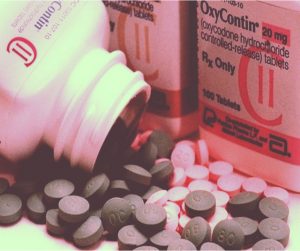Navigation:
[vc_row][vc_column][vc_cta h2="Help Is Only A Phone Call Away" txt_align="center" shape="round" style="flat" color="vista-blue" el_width="sm" use_custom_fonts_h2="true" use_custom_fonts_h4="true"]Call Now 855-227-9535[/vc_cta] OxyContin is known by many as the controlled-release version of oxycodone. With an extended release formulation, this drug is designed to stay in the user’s system for a longer period of time, providing pain relieving effects for up to 12 hours. It’s, therefore, no surprise that this oxycodone-based opioid prescription medication is very potent. Many people get addicted to it because of its habit-forming properties. Even those who are taking it properly for painful chronic illnesses are at risk because of the drug’s high potential for abuse. The likelihood of developing dependence or getting addicted increases if OxyContin is misused. While the drug is certainly beneficial when used correctly, the high abuse potential is what makes it a Schedule II controlled substance. On this article, we will talk about everything you need to know about addiction treatment and the recovery process.What Are the Symptoms of Opioid Abuse?
 OxyContin is an opioid. This means most of the symptoms of abusing OxyContin are similar to the symptoms of abusing other narcotics. Because opioids tend to slow down brain activity, you may notice that a person abusing OxyContin is often drowsy or sleepy. They may become increasingly lethargic as they take large doses of this drug. Abusing any prescription medication will eventually lead to tolerance, which means the drug will start losing its effect. A tolerant individual will have to take larger doses of OxyContin just to get high. This is made even more dangerous by the fact that this extended-release opioid is already so potent. Taking large doses can lead to an overdose.
OxyContin is an opioid. This means most of the symptoms of abusing OxyContin are similar to the symptoms of abusing other narcotics. Because opioids tend to slow down brain activity, you may notice that a person abusing OxyContin is often drowsy or sleepy. They may become increasingly lethargic as they take large doses of this drug. Abusing any prescription medication will eventually lead to tolerance, which means the drug will start losing its effect. A tolerant individual will have to take larger doses of OxyContin just to get high. This is made even more dangerous by the fact that this extended-release opioid is already so potent. Taking large doses can lead to an overdose.
How Does Medical Detox Work?
If a person becomes drug dependent, they won’t be able to quit the drug without going through withdrawal. These unpleasant symptoms, plus the intense cravings they’ll experience, will force them to relapse. In order to recover from drug dependence, they will have to go through proper medical detox. A comprehensive drug treatment program is often necessary to help addicted people get sober again. These programs are personalized plans that cater to their specific needs. After all, everyone goes through addiction differently. If a person starts abusing their prescription, they’ll become drug dependent—but that does not always mean they will get addicted. Addiction is a medical condition that involves the compulsive intake of a certain drug. Medical detox works by gradually weaning the user off of their chosen opioid. Sometimes a replacement opioid is used to soften the blow and make it easier for medical professionals to manage the withdrawal symptoms. Addiction treatment, especially inpatient treatment, is particularly helpful because it keeps the patient safe. Withdrawal symptoms may range from unpleasant to life-threatening. That is why medical attention is necessary during the detox process. Common withdrawal symptoms caused by opioid abuse include anxiety, muscle aches, joint pain, agitation, diarrhea, nausea, vomiting, and stomach cramps. Opioids also have a tendency to affect the respiratory system because they can slow down or stop a person’s breathing. Withdrawal symptoms can range in intensity, depending on a number of factors like drug history, age, metabolism, health condition, and other co-occurring disorders. [maxbutton id="2" ] Addiction is a medical condition, but it also has an emotional and psychological aspect to it, which is why a person’s mental health should also be addressed. Behavioral therapy can help them address the root cause of addictive behavior. Techniques like counseling, addiction education, and meditation can go a long way in their fight against addiction. Look for an addiction treatment facility near you today!
How to Recover from OxyContin Addiction: Your Drug Rehab Guide Read more on: www.rehabnear.me
from
https://www.rehabnear.me/oxycontin-addiction/

No comments:
Post a Comment